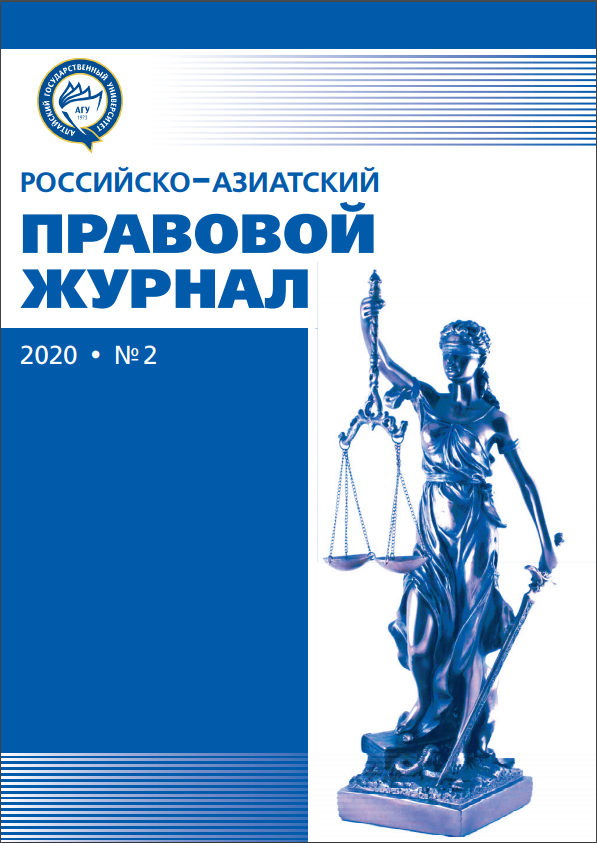AMENDMENTS TO THE CONSTITUTIONS OF THE REPUBLIC OF BULGARIA AND THE REPUBLIC OF KAZAKHSTAN: REGULATORY REQUIREMENTS AND ISSUES (COMPARATIVE ASPECTS)
УДК 34.05 ББК 67.91
Abstract
The article compares conditions and procedures for the adoption of Constitution and amendments to thecurrent constitution between the Republic of Bulgaria and the Republic of Kazakhstan. The criteria used inthe legal theory for the classification of the constitutions according to the way of their change are used. Bothconstitutions refer to the category of the hard. Bulgaria has a solid core of the constitution, which can onlybe changed by a specially elected institution — a Great (Grand) National Assembly. In Kazakhstan there areeven texts that are not subject to change. The experience of several changes to the two basic laws has beenconsidered. Whit them some of the questions have been answered by juridical theory and practice, whileothers remain open. At the end, conclusions are drawn from the parallel between the changes to the bothconstitutions, some of which are of universal significance.
Downloads
References
2. Ryan M. & St. Foster. Unlocking Constitutional and Administrative Law. 3-d ed. Routledge, 2014.
3. Grimm D. Types of Constitutions // The Oxford Handbook of Comparative Constitutional Law.Ed. by M. Rosenfeld, A. Sajo. Oxford, 2012.
4. Van Alstyne W.W. The Idea of the Constitution as Hard Law // Journal of Legal Education. 1987. Vol. 37.
5. Grimm D.Op. cit
6. Benz A. Balancing Rigidity and Flexibility: Constitutional Dynamics in Federal Systems // West European Politics. 2013. Vol. 36; 2013. Issue, 4. URL: https://www.doi.org/10.1080/01402382.2013.783 346
7. Матаева М. Некоторые особенности процедуры внесения изменений и дополнений в Конституции Казахстана и стран Центральной Азии // Вестник Томского государственого университета. 2003. №292.
8. «Държавен вестник» (ДВ), бр. 85 от 26. 09. 2003 г.; ДВ, бр. 27 от 2006 г.; ДВ, бр. 12 от 02. 2007 г.; ДВ, бр. 100 от 18. 12. 2015 г.
9. ДВ, бр. 18 от 25. 02. 2005 г.
10. Турецки Н.Н. Законодательная ветв власти Казахстана. 2-е изд. Астана, 2015.
11. Неновски Н. Подлежи ли на конституционен съдебен контрол законът за ревизия на Конституцията? // Юридически свят. 2000. №1; Неновски Н. Конституционна ревизия и конституционен контрол // Юридически свят, 2003. №2; Стоилов Я. Държавната власт: правно-политически разграничения и съотношения. С., 2001; Решение на Конституционния съд №3 от 10. 04. 2003 г. по к. д. №22 от 2002 г. (ДВ, бр. 36 от 18. 04. 2003).
12. Регламент Парламента Республики Казахстан. Принят на совместном заседании палат Парламента Республики Казахстан 20 мая 1996 года. URL: http://www.parlam.kz/ru/regulation (дата обращения: 22.01.2019)
Russian-Asian Law Journal is a golden publisher, as we allow self-archiving, but most importantly we are fully transparent about your rights.
Authors may present and discuss their findings ahead of publication: at scientific conferences, on preprint servers, in public databases, and in blogs, wikis, tweets, and other informal communication channels.
Russian-Asian Law Journal allows authors to deposit manuscripts (currently under review or those for intended submission) in non-commercial, pre-print servers such as ArXiv.
Authors who publish with this journal agree to the following terms:
- Authors retain copyright and grant the journal right of first publication with the work simultaneously licensed under a Creative Commons Attribution License that allows others to share the work with an acknowledgement of the work's authorship and initial publication in this journal.
- Authors are able to enter into separate, additional contractual arrangements for the non-exclusive distribution of the journal's published version of the work (e.g., post it to an institutional repository or publish it in a book), with an acknowledgement of its initial publication in this journal.
- Authors are permitted and encouraged to post their work online (e.g., in institutional repositories or on their website) prior to and during the submission process, as it can lead to productive exchanges, as well as earlier and greater citation of published work (See The Effect of Open Access).








